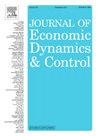Pride and persistence: Social comparisons in production
IF 2.3
3区 经济学
Q2 ECONOMICS
引用次数: 0
Abstract
Work is ordinary and necessary for most people, but some people work excessively (“work persistence”), seemingly driven by internal forces. We theoretically and experimentally investigate the role of relative performance incentives in causing or exacerbating work persistence. In our setting, agents perform a task over two stages. In the first stage, they can earn prizes, which are allocated either randomly or according to relative performance. Afterwards, they have the opportunity to continue working in a second stage, with payment by piece rate and no competition against others. Our theoretical model of motivated belief updating predicts that agents adjust their beliefs asymmetrically: they attribute their relative performance more to their productivity if they win a prize, and more to luck if they lose. This bias leads winners of the first-stage prize to increase their effort in the subsequent piece-rate stage, but with no corresponding decrease in work effort by losers. Results from a real-effort experiment confirm these predictions: winners' effort in the piece-rate stage is roughly 30 percent higher when earlier bonus prizes had been allocated by performance, compared to when those prizes had been allocated randomly. Losers' effort is also higher – not lower – though this difference is not significant.
骄傲和坚持:生产中的社会比较
对大多数人来说,工作是平凡和必要的,但有些人工作过度(“工作坚持”),似乎是由内在力量驱动的。我们从理论上和实验上研究了相对绩效激励在引起或加剧工作持久性方面的作用。在我们的设置中,代理分两个阶段执行任务。在第一阶段,他们可以获得奖品,奖品要么是随机分配的,要么是根据相对表现分配的。之后,他们有机会在第二阶段继续工作,计件工资,没有竞争。我们的动机信念更新理论模型预测,代理人会不对称地调整他们的信念:如果他们赢了奖,他们会更多地将自己的相对表现归因于他们的生产力,如果他们输了奖,则更多地归因于运气。这种偏见导致第一阶段奖金的赢家在接下来的计件工资阶段增加了他们的努力,而失败者的努力却没有相应减少。一项实际努力实验的结果证实了这些预测:与随机分配奖金相比,早期奖金按绩效分配时,获奖者在计件工资阶段的努力程度大约高出30%。失败者的努力程度也更高——而不是更低——尽管这种差异并不显著。
本文章由计算机程序翻译,如有差异,请以英文原文为准。
求助全文
约1分钟内获得全文
求助全文
来源期刊

Journal of Economic Dynamics & Control
ECONOMICS-
CiteScore
3.10
自引率
10.50%
发文量
199
期刊介绍:
The journal provides an outlet for publication of research concerning all theoretical and empirical aspects of economic dynamics and control as well as the development and use of computational methods in economics and finance. Contributions regarding computational methods may include, but are not restricted to, artificial intelligence, databases, decision support systems, genetic algorithms, modelling languages, neural networks, numerical algorithms for optimization, control and equilibria, parallel computing and qualitative reasoning.
 求助内容:
求助内容: 应助结果提醒方式:
应助结果提醒方式:


